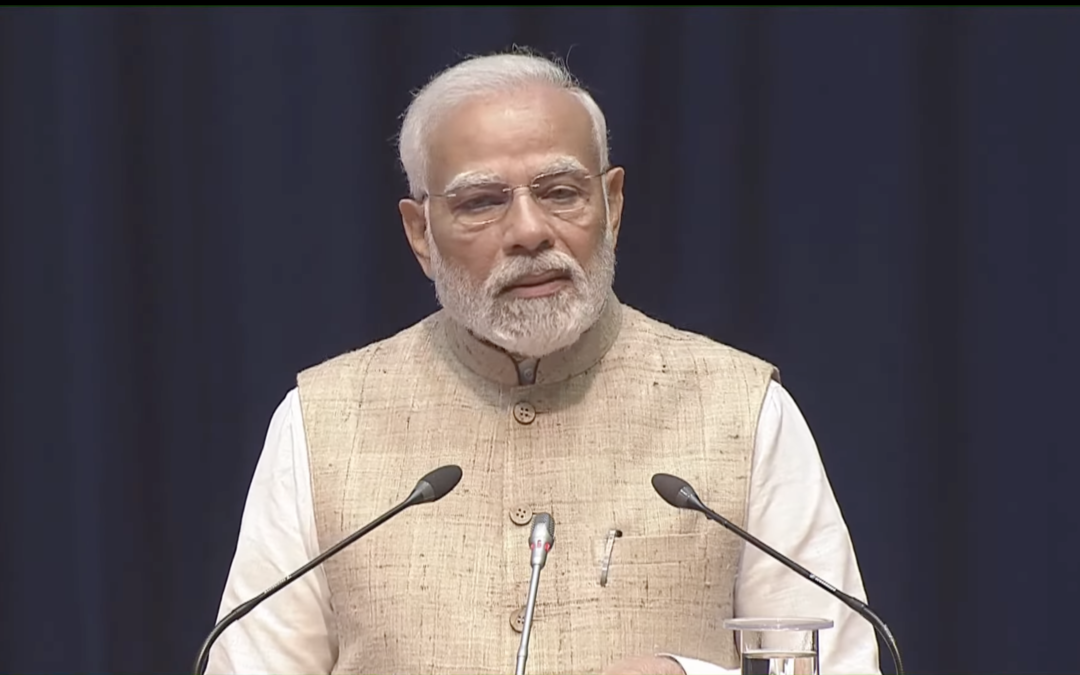Prime Minister Narendra Modi
Emphasising on ethical use of AI with security, dignity, equity being at the centre, Prime Minister Narendra Modi said global institutions should come together to work out dos and don’ts
New Delhi: Prime Minister Narendra Modi on Tuesday made a fervent pitch for framing of a global digital framework, with clear-cut dos and don’ts for ethical use of technology.
Speaking at the inauguration of the International Telecommunication Union – WTSA and India Mobile Congress here, he said just like the aviation sector, where the global community has framed a comprehensive framework, the digital world too needs rules and regulations.
Global institutions, he said, should come together to work out dos and don’ts.
He went on to emphasise on ethical use of AI with security, dignity, equity being at the centre.
Talking of India’s experience, he said after the expeditious roll out, 5G telecom services are now available in most places across the country and work on 6G has already begun.
Giving out statistics, the Prime Minister said India has in the last decade become an exporter of mobile phones from being an importer, and has laid an optic fibre network that is eight-time more than the distance between earth and the moon.
India’s digital vision that was unveiled in 2014 rests on four pillars — making devices cheaper, connectivity reaching all concerns, affordable data and digital-first, he said.
“We have made digital connectivity an effective tool for last-mile delivery,” he said.
Modi said India is willing to share its experience of successful building of digital public infrastructure with the rest of the world.
Discussing telecom sector reforms, the Prime Minister noted India’s efforts in lowering data costs. The cost of internet data in India is now as low as 12 cents per GB compared to many countries in the world where one GB of data is 10 to 20 times more expensive.
“Today, every Indian consumes about 30 GB of data on an average every month”, said PM Modi.
Today, the country has a mobile phone user base of 120 crore, 95 crore internet users and digital transactions of more than 40 per cent of the entire world in real-time.
“India had showcased how digital connectivity had become an effective tool for last-mile delivery,” said PM Modi.
“India’s mobile and telecom journey in the 21st century is a subject of study for the whole world. Telecom is not just a medium of connectivity but also a medium of equity and opportunity in India,” the Prime Minister emphasised.
The Prime Minister also underscored the remarkable advancements in infrastructure, including the rapid installation of Wi-Fi facilities at public places like railway stations and the connection of islands like Andaman-Nicobar and Lakshadweep through undersea cables.
“In just 10 years, India has laid optical fibre which is eight times the distance between Earth and the Moon”, said PM Modi, adding that the country is already progressing towards 6G technology, ensuring a future-ready infrastructure.
India democratised digital technology and created digital platforms where innovations on these platforms created millions of new opportunities The transformative power of the JAM Trinity—Jan Dhan, Aadhaar, and Mobile—has laid the foundation for countless innovations.
PM Modi said that Unified Payments Interface (UPI) has provided new opportunities for many companies and ONDC is revolutionising digital commerce.
“In an interconnected world, security cannot be an afterthought. India’s Data Protection Act and National Cyber Security Strategy reflect our commitment to building a safe digital environment”, noted PM Modi.
It is for the first time that the ITU-WTSA is being hosted in India and the Asia-Pacific. The global event has brought together more than 3,000 industry leaders, policy makers and tech experts from over 190 countries, representing telecom, digital and ICT sectors.

